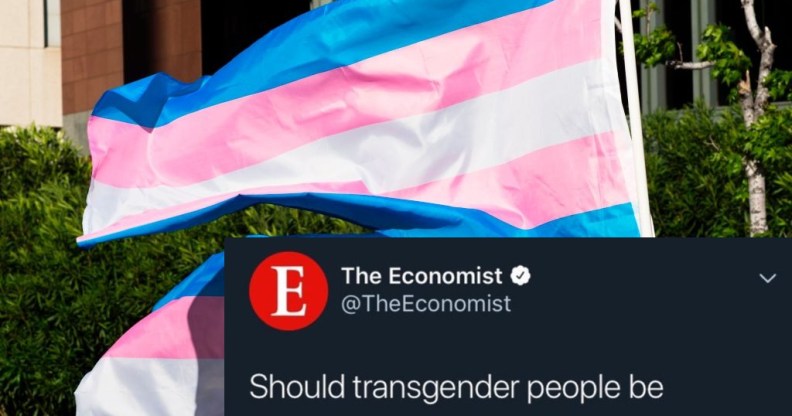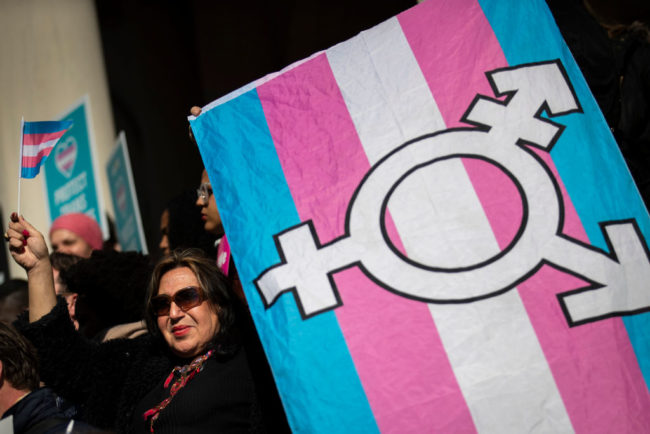The Economist under fire for asking if transgender people should be sterilised

Transgender flag (ROBYN BECK/AFP/Getty)
Transgender flag (ROBYN BECK/AFP/Getty)
The Economist has come under fire for posting an article about transgender people on Twitter with the question: “Should transgender people be sterilised before they are recognised?”
The article – which is titled “Japan says transgender people must be sterilised” – is about an ongoing situation in Japan where transgender people must be sterilised before they can be legally recognised as their correct gender.
The first line of the article reads: “Should transgender people be sterilised before they are recognised? Earlier this year Japan’s Supreme Court decided that the answer is yes.”
However, the article was posted on Twitter alongside just the first half of that sentence, which led to outrage from transgender activists.
The Economist said the tweet ‘mischaracterised’ the article
The publication deleted the tweet yesterday and posted a clarification which said that their original post had “mischaracterised” the article. Despite this, the publication did not issue an apology until today.
In another follow-up tweet today, The Economist said: “We were wrong to use the first line of this article out of its context. Sorry.”
A spokeswoman for The Economist told PinkNews that the first line of the article had been used in the original tweet, and said that it was “taken out of context.”
“The article explores in detail a question that was put to Japan’s Supreme Court. Our tweets often use a line from the articles they link to. We’ve noted the error and corrected it in subsequent tweets.”
– Spokesperson for The Economist
“The article explores in detail a question that was put to Japan’s Supreme Court. Our tweets often use a line from the articles they link to. We’ve noted the error and corrected it in subsequent tweets,” they said.

Drew Angerer/Getty
The publication’s article referenced the case of Takakito Usui, who was told by Japan’s Supreme Court earlier this year that he would have to have his ovaries and uterus removed before he could identify legally as a man.
Transgender model Munroe Bergdorf: ‘I can’t believe that I am reading this’
Trans activists heavily criticised the publication for the tweet. Paris Lees wrote on Twitter: “The fact that a publication that is respected around the world now thinks it’s acceptable – in any context – to ask if members of a minority should be sterilised reveals how low public discourse has sunk in the UK and the unprecedented atmosphere of hostility towards trans people.”
Transgender model Munroe Bergdorf posted a screenshot of the original – now deleted – tweet, saying: “I can’t believe that I am reading this.
“I can’t believe that in 2019 these are the conversations being had in supposedly mainstream media outlets about people like me.”
– Transgender model Munroe Bergdorg
“I can’t believe that in 2019 these are the conversations being had in supposedly mainstream media outlets about people like me.”
Bergdorf then compared the question to Nazi eugenics, and said she was “disgusted and appalled” by the tweet.
“Shame on you @theeconomist. This is how you open to [sic] door for genocide, not equality.”
‘Shocking and highly revealing misstep’
Meanwhile, LGBTQ+ rights campaigner Adrian Harrop told PinkNews that the question was a “shocking and highly revealing misstep.”
“It has served to demonstrate the pervasive culture of hostility towards the transgender community within the British press, which seems to escalate on an almost daily basis.”
Harrop continued: “Transphobia has no place in a modern and progressive society. It must be called out for what it is, and challenged wherever it is found.”
“Transphobia has no place in a modern and progressive society. It must be called out for what it is, and challenged wherever it is found.”
– Adrian Harrop
Earlier this month, a number of high profile people, including actress Emma Thompson, signed an open letter where they criticised an increasingly “narrow and archaic” debate around transgender people’s rights.
Both sides have a plethora of platforms to outline their position,” the letter said. “However, it is imperative that these platforms should not be used to spread misinformation or misrepresent the law or the facts in this area.”

